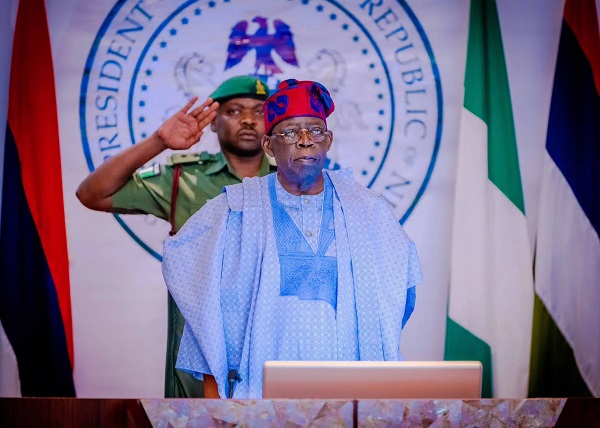Our Resolve For State Police Unwavering —Tinubu
President Bola Tinubu on Monday said his administration’s resolve to reform the Nigeria Police Force and establish State Police across Nigeria is unwavering.
The President observed that the idea of state policing is not just a mere policy proposal but a potential milestone in the evolution of the nation’s law enforcement framework that would create the opportunity to fashion law enforcement in a manner that would closely address the various demands of communities across the country.
Former President Goodluck Jonathan said that there is no need to debate about state police, adding that the issues of state police and Coast Guards were accepted at the 2014 National Conference.
Speaking when he declared open a one-day National Dialogue on State Policing with the theme “Pathways to Peace: Reimagining Policing in Nigeria,” held at the Abuja Continental Hotel, President Tinubu urged participants to consider the implications of state police.
The President, who was represented by the Vice President, Senator Kashim Shettima, noted that his administration is very aware of the complex security issues confronting Nigeria and, as such, is continually developing and refining its strategies and methods to address the challenges effectively.
Declaring the President’s resolve to change the nation’s security narrative, the VP, in a statement by his spokesman, Stanley Nkwocha, said, “The commitment of the administration of President Tinubu to reform the police force and enhance security at both the national and state levels is unwavering.
“We view the outcomes of today’s deliberations as crucial inputs that will guide the government’s actions towards reforming the institution of the police and achieving a safer and more secure Nigeria.”
Senator Shettima implored participants at the National Dialogue on State Policing to look at the idea of state policing from multiple angles, saying the President deserves commendation for being open and proactive towards the idea of reforming and decentralising the police force.
He stated, “In our deliberations, let us consider the implications of state policing from multiple perspectives. We must evaluate its potential to improve response times to emergencies, adapt to specific local challenges, and increase accountability. At the same time, we must address concerns related to the standardisation of training, oversight, and the safeguarding of civil liberties.
“Our dialogue today should also be seen as an opportunity to listen, understand, and propose solutions that bridge gaps. It is essential that this forum is not the end but the beginning of an ongoing conversation on the issue of police and security sector reform in our country.”
VP Shettima expressed delight that the 10th House of Representatives under Speaker Tajudeen Abbas keyed into the idea of state policing, noting that “the involvement of the legislature in executive reform proposals ensures continuity and synergy.
“Let us use this opportunity to engage and explore every option with the seriousness and diligence they demand. The President is committed to listening to your recommendations and insights, invaluable to shaping the policies that will lead us toward a more secure and just society,” he added.
In his remarks, Chairman of the occasion, former President Goodluck Jonathan, commended the organisers of the national dialogue, saying, “the issue today is not whether to establish state police but how it should be operated.”
“There is no need to debate about state police. The issues of state police and Coast Guards were accepted at the 2014 National Conference,” he added.
The former President said the Nigeria Customs Service and other agencies at the border are not trained to deal with criminal gangs, even as he asked the government to concentrate on how to manage the state police in a way that it would not be hijacked by the political class.
He recommended that the Act establishing the Independent National Electoral Commission (INEC) be rejigged so that the police are not used for election malpractices and stuffing of the ballot boxes in states.
In the same vein, former Head of State, Gen Abdulsalami Abubakar (rtd), maintained that to make peace and ensure a safe society, governors must be transparent, responsible, and honest, as well as make the citizens go about their normal businesses.
He said the government should make laws to provide for an orderly environment, urging citizens to stop destroying or vandalizing public properties.
He also advised that traditional institutions and royal fathers should be given roles to play and be engaged in maintaining peace and order in their respective domains.
Also in his remarks, Speaker of the House of Representatives, Rt. Hon. Tajudeen Abbas, thanked participants at the dialogue, especially President Tinubu, Vice President Shettima, Gen Abdulsalami, and former President Jonathan, for lending their voices to the issue of establishing state police in the country.
He stated that, as former President and Head of State, their contributions will provide direction to the discourse on the issue of state police, given the dimension of insecurity in the country.
In his opening remarks, the Deputy Speaker of the House of Representatives, Rt Hon. Benjamin Kalu, recalled that the national dialogue gained momentum after President Tinubu called a meeting of governors and other stakeholders at the Presidential Villa to discuss issues about establishing state police in the country.
“The National Assembly is currently considering a bill towards establishing state police,” he said, stressing that other countries like the “United States of America have a multi-layer police system with federal, state, country, and the FBI.”
Present at the event were the Deputy Senate President, Senator Barau Jibrin; Minister of Police Affairs, Ibrahim Gaidam; Minister of Budget and National Development, Dr. Atiku Bagudu; and Minister of State for Agriculture, Mustapha Baba Shehuri.
Others were former Minister of Interior, General Abdulrahman Bello Dambazau; the Sultan of Sokoto, Alhaji Sa’ad Abubakar III; the Ooni of Ife, HRM Oba Adeyeye Enitan Ogunwusi; the Obi of Onitsha, HRM Nnaemeka Alfred Achebe; and the Emir of Zazzau, Alhaji Shehu Idris, among others.


